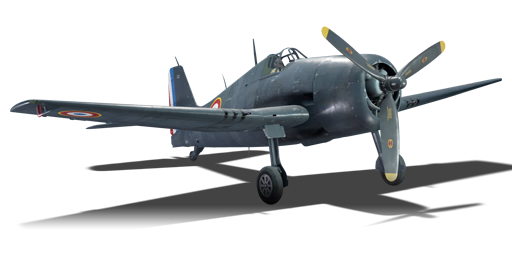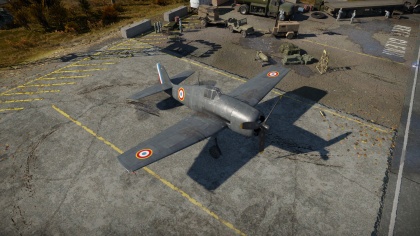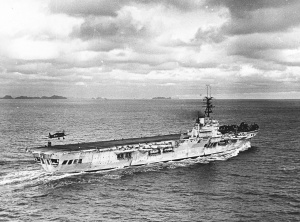Difference between revisions of "F6F-5 (France)"
(→Details) (Tag: Visual edit) |
Bonisducks (talk | contribs) (→History) (Tag: Visual edit) |
||
| Line 222: | Line 222: | ||
== History == | == History == | ||
| − | '' | + | [[File:F6F-5 landing on CV Arromanches, Gulf of Tonkin, 1953.jpg|thumb|A French F6F-5 lands on ''Arromanches'' during the Indochina War, circa 1953. The F6F's ruggedness and reliability made it an effective aircraft for the Asian theatre.]] |
| + | The F6F-5, as a battle-hardened veteran of the Second World war, was chosen as a potential carrier-based naval fighter and strike aircraft by the French ''Aeronavale'', in the process of rebuilding France's military. Thus, the Air Ministry procured a total of 124 F6F-5 and 15 F6F-5N aircraft from Grumman between 1950 and 1953. The aircraft were based on the French aircraft carriers CV Arromanches (formerly HMS Colossus), CVL Lafayette and (formerly USS Langley) CVL Bois-Belleau (formerly USS Belleau Wood). | ||
| + | |||
| + | The aircraft served during the first Indochina war, between 1951 and 1954. The aircraft served with the 11F and 12F combat squadrons as well as the 54S, 57S and 59S training squadrons. The aircraft was complemented by F4U Corsairs of the ''Aeronavale'', and later on, the F8F Bearcat. However, the relative oblesence of the aircraft made it's service life short - most units were withdrawn from service after the Indochina war, and almost all aircraft had been scrapped by 1960. | ||
== Media == | == Media == | ||
Revision as of 14:27, 10 November 2020
Contents
| This page is about the French fighter F6F-5 (France). For other uses, see F6F (Family). |
Description
The ▄F6F-5 Hellcat is a rank II French fighter
with a battle rating of 3.0 (AB), 3.3 (RB), and 3.7 (SB). It was introduced in Update 1.73 "Vive la France".
General info
Flight performance
Describe how the aircraft behaves in the air. Speed, manoeuvrability, acceleration and allowable loads - these are the most important characteristics of the vehicle.
| Characteristics | Max Speed (km/h at 5,730 m) |
Max altitude (meters) |
Turn time (seconds) |
Rate of climb (meters/second) |
Take-off run (meters) | |||
|---|---|---|---|---|---|---|---|---|
| AB | RB | AB | RB | AB | RB | |||
| Stock | 620 | 599 | 11000 | 21.6 | 22.4 | 8.9 | 399 | |
| Upgraded | 680 | 647 | 19.4 | 20.5 | 17.7 | 12.7 | ||
Details
| Features | |||||
|---|---|---|---|---|---|
| Combat flaps | Take-off flaps | Landing flaps | Air brakes | Arrestor gear | |
| ✓ | ✓ | ✓ | X | ✓ | |
| Limits | ||||||
|---|---|---|---|---|---|---|
| Wings (km/h) | Gear (km/h) | Flaps (km/h) | Max Static G | |||
| Combat | Take-off | Landing | + | - | ||
| 803 | 375 | 510 | ___ | 310 | ~12 | ~4 |
| Optimal velocities (km/h) | |||
|---|---|---|---|
| Ailerons | Rudder | Elevators | Radiator |
| < 432 | < 420 | < 420 | > 420 |
| Compressor | Optimal altitude | 100% Engine power | WEP Engine power |
|---|---|---|---|
| Setting 1 | 518 m | 2,000 hp | 2,398 hp |
| Setting 2 | 4,724 m | 1,800 hp | 2,158 hp |
| Setting 3 | 6,400 m | 1,650 hp | 1,978 hp |
Survivability and armour
- 38 mm Bulletproof glass in front of the pilot
- 6.35 mm Steel plates behind the pilot
- 3 mm Steel plates on fuselage top in front of the cockpit
- 3 mm Steel plate on the top front of oil cooling system
- 3 mm Steel plates on the bottom of the engine
Armaments
Offensive armament
The F6F-5 (France) is armed with:
- 6 x 12.7 mm M2 Browning machine guns, wing-mounted (400 rpg = 2,400 total)
The six machine guns are arranged in bundles of three mounted in both wings. Each is armed with the same amount of ammunition, which means that all guns will fire with each other until empty.
Suspended armament
The F6F-5 (France) can be outfitted with the following ordnance:
- Without load
- 6 x HVAR rockets
- 2 x Tiny Tim rockets
- 2 x 1,000 lb AN-M65A1 bombs (2,000 lb total)
- 2 x 1,000 lb AN-M65A1 bombs + 6 x HVAR rockets (2,000 lb total)
- 1 x Mk.13/44 (569 mm) torpedo
Usage in battles
The key to both surviving and owning in the F6F is to keep your speed up and try to be even marginally higher than your opponents. Below 300 km/h (186 mph) it is very sluggish. As with most American fighters, Boom & Zoom is the preferred combat mode for the Hellcat, while its average high-speed manoeuvrability can be used to add in a high yo-yo. It has a lot of ammo, but a good aim is still important since boom-n-zoom only allows you a small window of opportunity to hit your target before you have to climb back to altitude. Still, this is an excellent plane to practice your aim and tactics with because it's more forgiving than most boom-n-zoom fighters. If you don't have particularly good aim, a good tactic is to open up at 500 m (0.31 mi), starting with your aim on the aircraft, and then slowly move your aim in front of the target. You won't require as much lead when diving on your target at 600+ km/h (373+ mph).
With dual 1,000-pound bombs and six HVAR rockets armed, the Hellcat is a stable game-ending platform in a pinch when the rest of your team is not ground-attacking. The two Tiny Tim anti-tank rockets can also be useful for taking out more massive targets. Sometimes, it is useful to save the Hellcat as your last plane just for that. You can always jettison the rockets and bombs if you're suddenly forced to dogfight.
It is incredibly important to use Manual Engine Controls while piloting the Hellcat in Realistic or Simulator Battles. The Hellcat has access to three Supercharger gears, each tailored for a different altitude, and each will significantly improve your performance at their appropriate altitudes.
Keep in mind:
- It has a lot of engine power, but at anywhere between 5.7 and 7 tonnes, getting up to altitude isn't very easy.
- Resist the temptation to get into low-altitude turning fights. This is a heavy aircraft and it will lose a massive amount of speed in turns.
- While it has plenty of explosive armament options, in Realistic and Simulator battles the added weight and drag will usually make you an easy target for other fighters. Since most air battles are basically dogfights, you're often better off without the extra weight.
- This thing will perform reasonably well at low altitudes, but it's still recommended to stay at an altitude of 3 km or higher.
Manual Engine Control
| MEC elements | ||||||
|---|---|---|---|---|---|---|
| Mixer | Pitch | Radiator | Supercharger | Turbocharger | ||
| Oil | Water | Type | ||||
| Not controllable | Controllable Not auto controlled |
Controllable Not auto controlled |
Controllable Not auto controlled |
Separate | Controllable 3 gears |
Not controllable |
Modules
| Tier | Flight performance | Survivability | Weaponry | ||
|---|---|---|---|---|---|
| I | Fuselage repair | Radiator | Offensive 12 mm | ITC mk.III | |
| II | Compressor | Airframe | FRC mk.2 | ||
| III | Wings repair | Engine | New 12 mm MGs | LFRC mk.12 | |
| IV | Engine injection | Cover | FLBC mk.1 | ||
Pros and cons
Pros:
- Can carry a lot of payload for a rank III aircraft
- One of the few fighters that can carry a torpedo
- Very effective in either air-to-air or air-to-ground, very versatile
- Bombs are mounted directly under the fuselage, very accurate when dive bombing
- Good climb rate
- Excellent dive rate
- Good cockpit visibility
- Extremely efficient cooling system
- Lots of ammo
- Cheap repair cost
- Can take some hits
- Decent at energy fighting, although not as good as the Bf 109 F-4
Cons:
- You have to fly at a very low altitude at a deficient speed to drop the torpedo, which is impractical
- Only three salvos of HVAR rockets
- Carrying the 2 x 1000 lb bombs and the 6 x HVAR rockets also adds a worse climb rate
- Slower top speed compared to other contemporary US fighters
- Higher stall speed than its Japanese counterparts
- Control stiffening above moderate speeds
- Poor roll rate
- Large fuselage cross-section makes it an easy target
- Guns mounted further on the wings making it harder to aim at a target that is smaller than you
- Despite its formidable reputation as the Zero killer, a Zero could still easily kill it if you are forced to fight on the Zero's terms
History
The F6F-5, as a battle-hardened veteran of the Second World war, was chosen as a potential carrier-based naval fighter and strike aircraft by the French Aeronavale, in the process of rebuilding France's military. Thus, the Air Ministry procured a total of 124 F6F-5 and 15 F6F-5N aircraft from Grumman between 1950 and 1953. The aircraft were based on the French aircraft carriers CV Arromanches (formerly HMS Colossus), CVL Lafayette and (formerly USS Langley) CVL Bois-Belleau (formerly USS Belleau Wood).
The aircraft served during the first Indochina war, between 1951 and 1954. The aircraft served with the 11F and 12F combat squadrons as well as the 54S, 57S and 59S training squadrons. The aircraft was complemented by F4U Corsairs of the Aeronavale, and later on, the F8F Bearcat. However, the relative oblesence of the aircraft made it's service life short - most units were withdrawn from service after the Indochina war, and almost all aircraft had been scrapped by 1960.
Media
Excellent additions to the article would be video guides, screenshots from the game, and photos.
See also
Links to the articles on the War Thunder Wiki that you think will be useful for the reader, for example:
- reference to the series of the aircraft;
- links to approximate analogues of other nations and research trees.
External links
Paste links to sources and external resources, such as:
- topic on the official game forum;
- encyclopedia page on the aircraft;
- other literature.
| Grumman Aircraft Engineering Corporation | |
|---|---|
| Aircraft | |
| Fighters | |
| F3F | F3F-2 · Galer's F3F-2 |
| F4F Wildcat | F4F-3 · F4F-4 |
| XF5F Skyrocket | XF5F · XP-50 |
| F6F Hellcat | F6F-5 · F6F-5N |
| F7F Tigercat | F7F-1 · F7F-3 |
| F8F Bearcat | F8F-1 · F8F-1B |
| Jet Fighters | |
| F9F Panther/Cougar | F9F-2 · F9F-5 · F9F-8 |
| F-11 Tiger | F11F-1 |
| F-14 Tomcat | F-14A Early · F-14B |
| Jet Strike Aircraft | |
| A-6 Intruder | A-6E TRAM |
| Bombers | TBF-1C |
| Export | ▄Martlet Mk IV · ▄F6F-5 · ▄F6F-5N · ▄F8F-1B · ▄Avenger Mk II · ▄Hellcat Mk II |
| ▄F-14A IRIAF | |
| Naval Vehicles | |
| Patrol Gunboat Hydrofoil (PGH) | USS Flagstaff |
| France fighters | |
|---|---|
| Dewoitine | D.371 · D.371 H.S.9 · D.373 · D.500 · D.501 · Pallier's D.510 · D.520 |
| Morane-Saulnier | M.S.405C1 · M.S.406C1 · M.S.410 |
| Arsenal | V.G.33C-1 |
| Bloch | M.B.152C1 · M.B.157 |
| Caudron | C.R.714 |
| Sud-Ouest | S.O.8000 Narval |
| American | H-75A-1 · H-75A-4 · ▄P-39Q-25 · ▄P-40F-5 Lafayette · ▄P-47D-22-RE · ▄P-63C-5 · F-6C-10-NA |
| ▄F6F-5 · ▄F6F-5N · F4U-7 · ▄F8F-1B | |
| Other countries | ▄Seafire LF Mk.III · ▄Yak-3 · Challe's ▄Yak-9T · NC.900 |
| Belgium | ▄Gladiator Mk I · ▄Spitfire FR Mk XIVe |
| Netherlands | ◘Sea Fury FB 51 |






